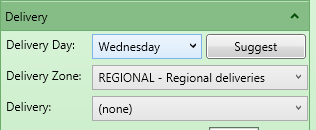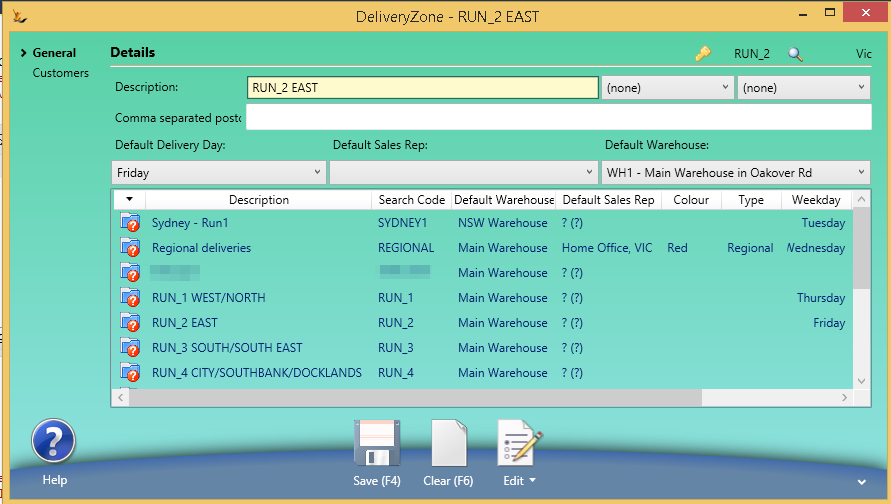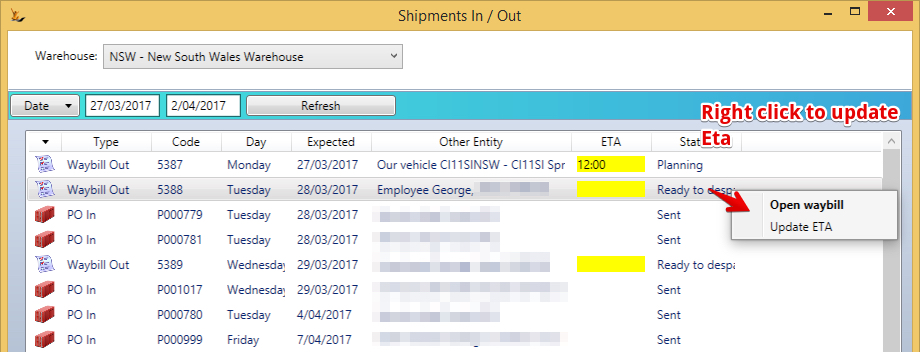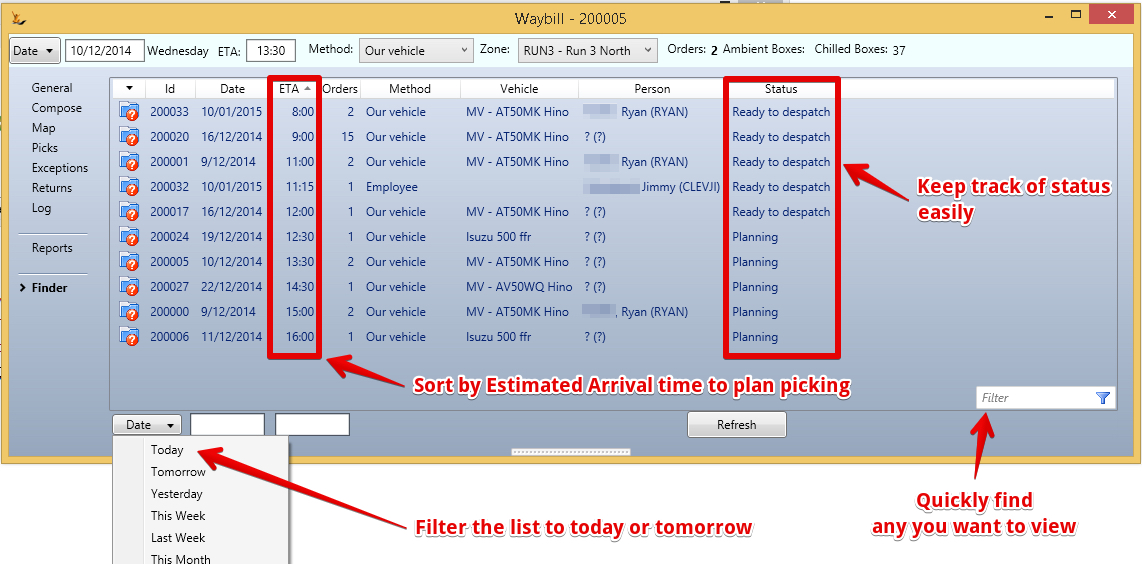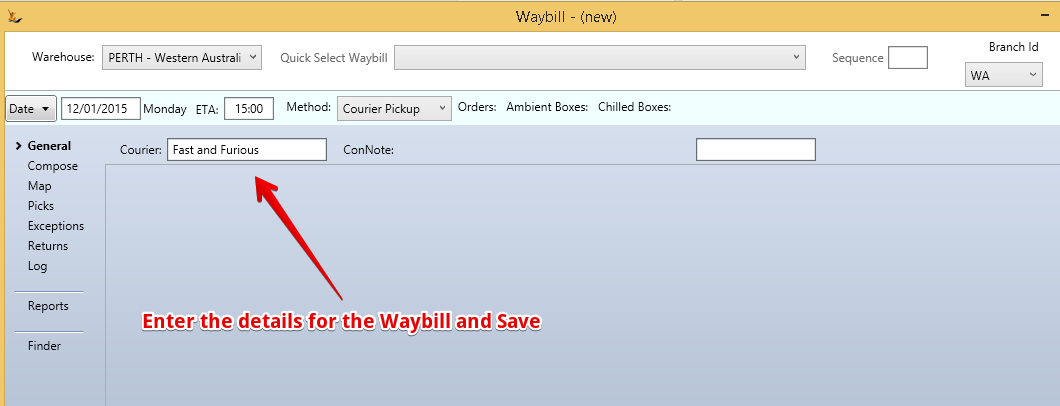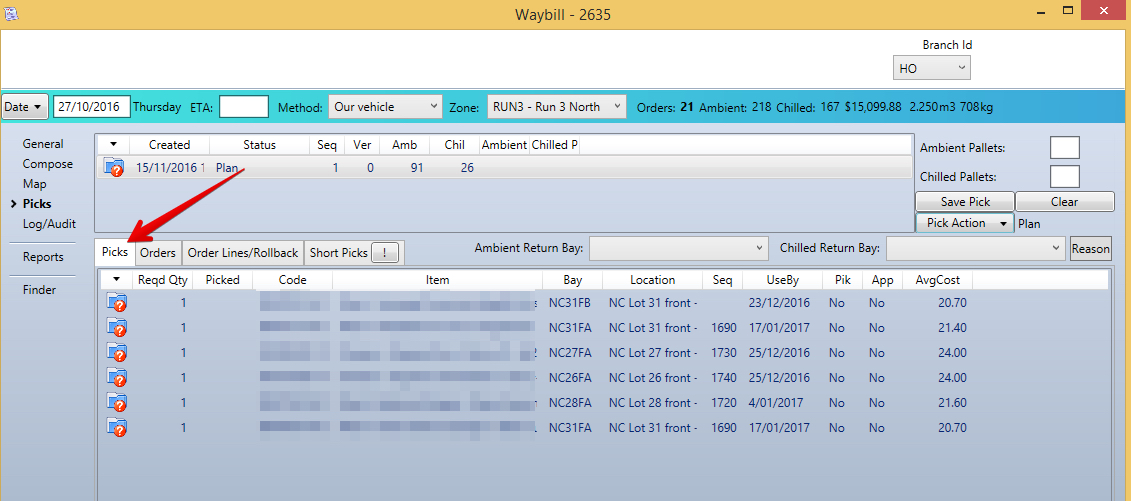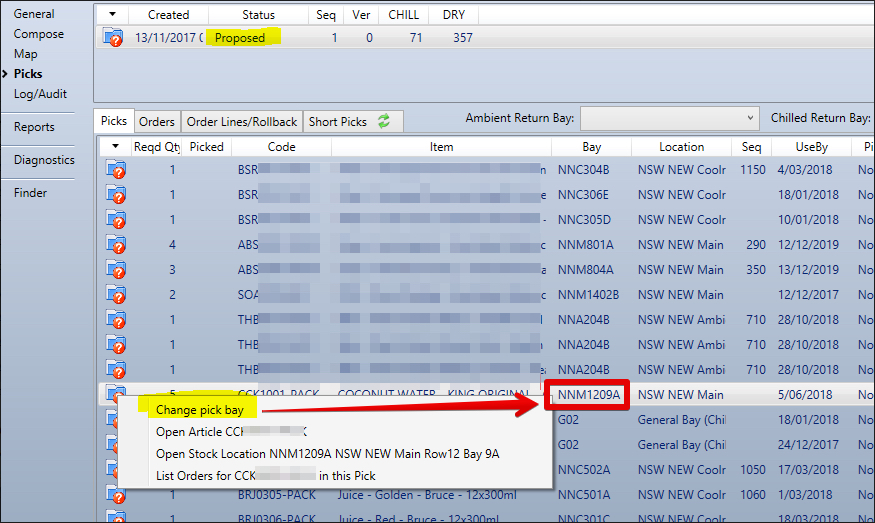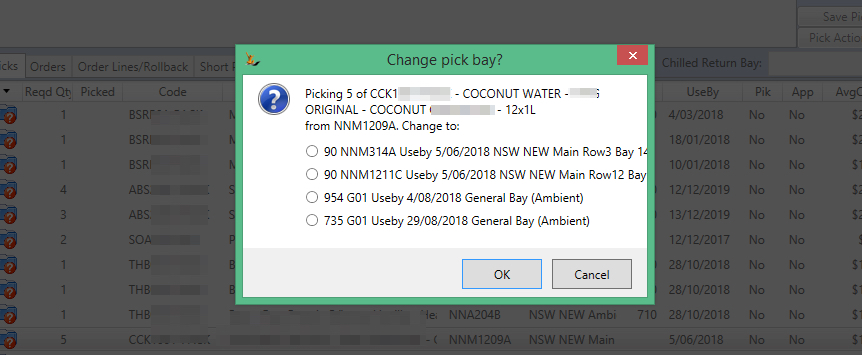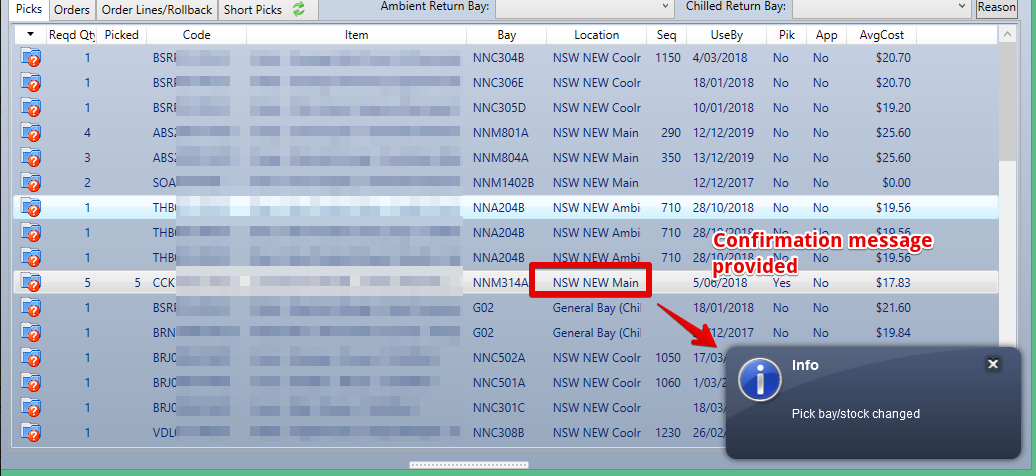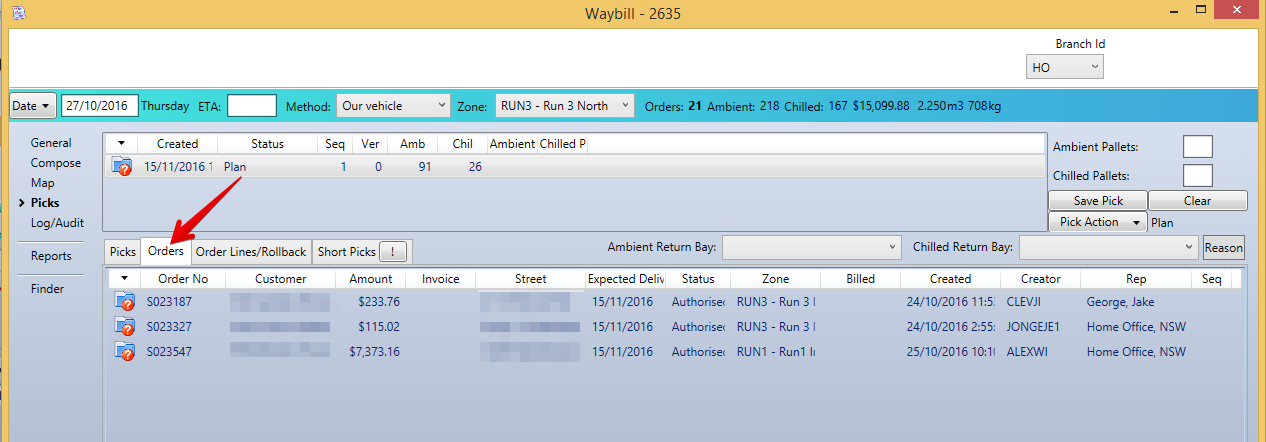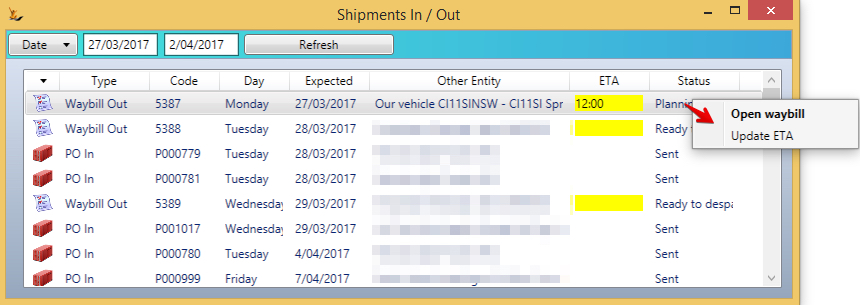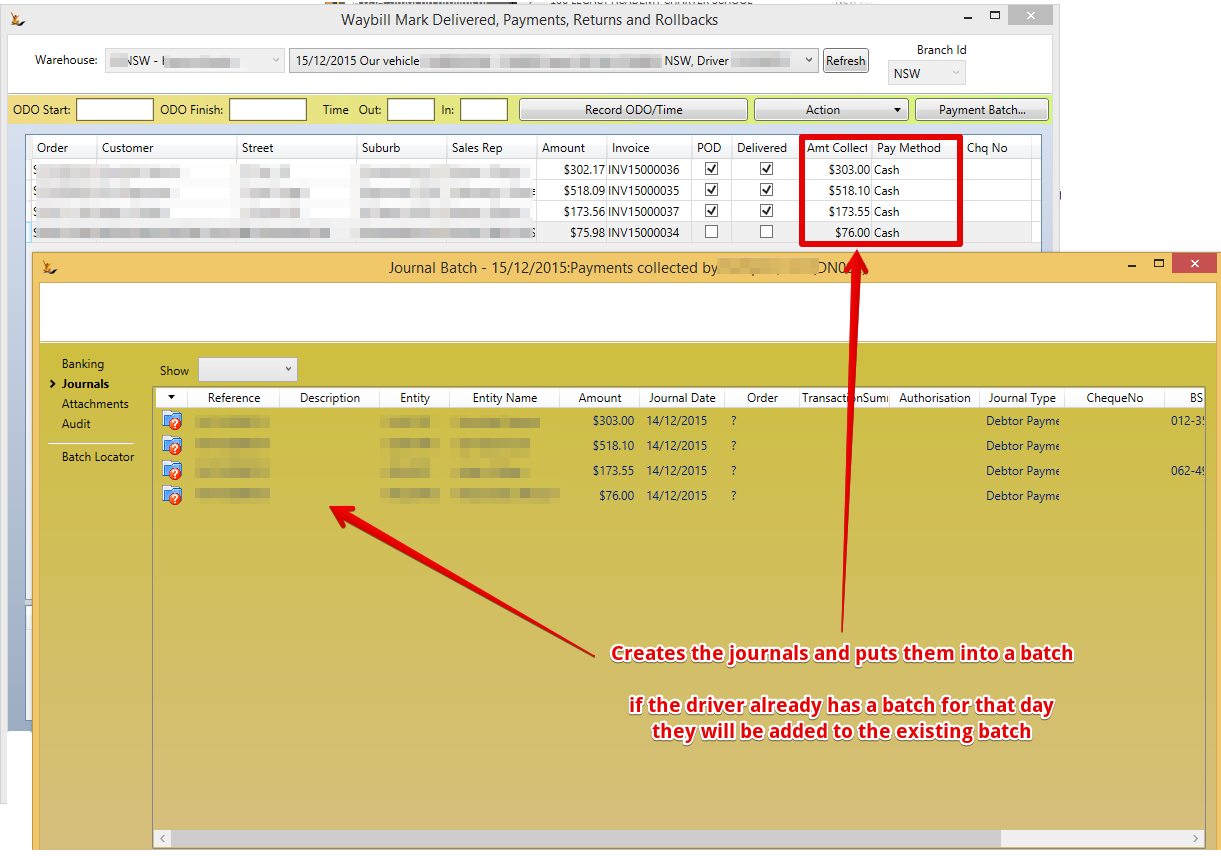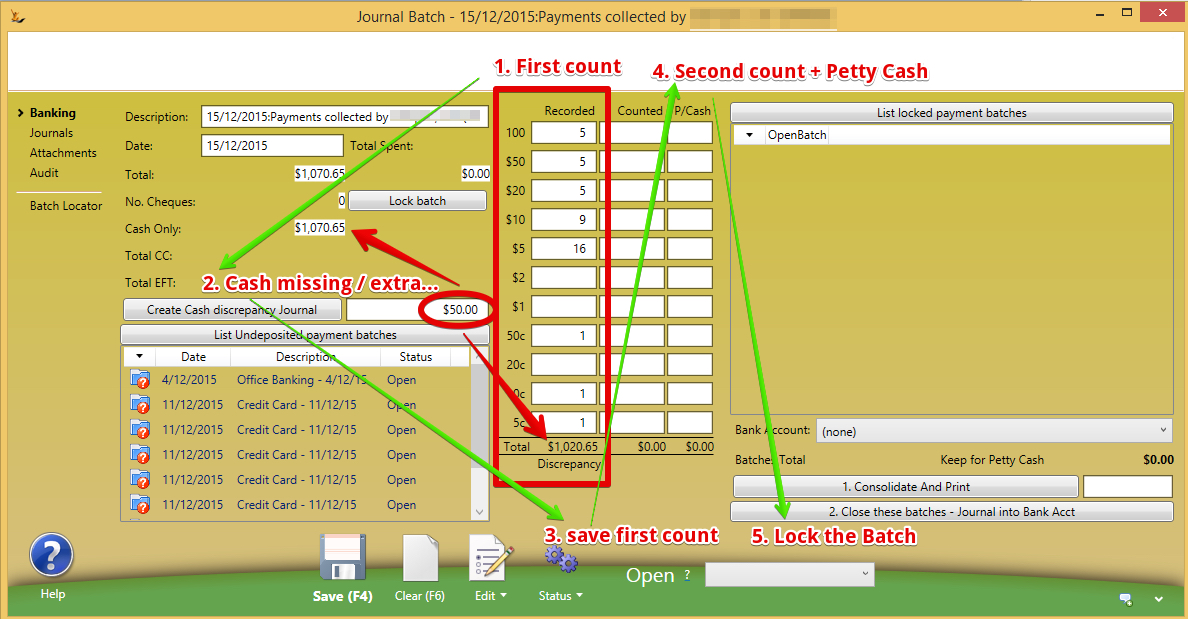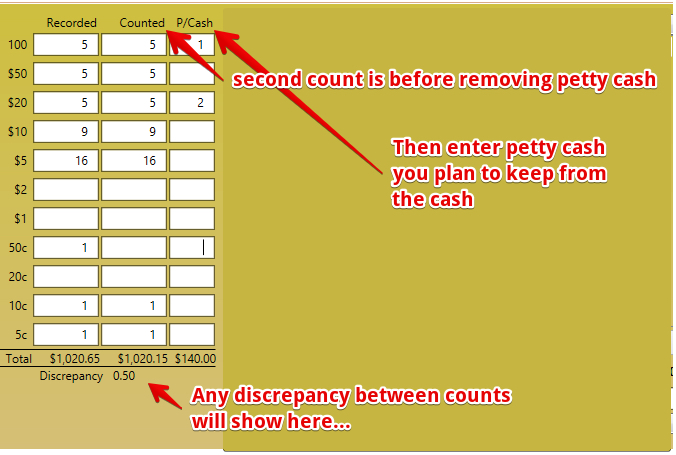Waybills are used if your business wants to track every outbound stock movement as being linked to a waybill document that is carried by your own vehicles, other companies or picked up.
Useful when grouping together orders into delivery runs - picking multiple orders in a single pick then optionally labelling each box after picking.
Table of Contents
| Table of Contents |
|---|
Overview
Waybills are a way of tracking all the stock that is leaving the building and every time stock is taken from the site a waybill printout will be provided.
...
| Gliffy | ||||
|---|---|---|---|---|
|
Cold Chain
Cold chain is required for foods tracking
- Stock may require to be stored in temperature controlled locations (Ambient, Chilled, Frozen, Controlled)
- Label printing Sequence
- Print labels by Order and Pallet Type (by SKU) grouped by pallet type within order.
- Print labels by Pallet Type and Order (by SKU) grouped by order within pallet type
- Label printing layouts
- Pallet Type of DRY print on the labels in black on white with a black border.
- Other pallet types, e.g. CHILL, print in white on black.
- The small 'x of y' that prints above the pallet type shows the sequence and total for the pallet type in the order.
- The larger 'x of y' that prints below the pallet type shows the sequence and total in the order.
Define the Pallet groupings used
- It is important when creating pallets to send out that stock is grouped and travels to maintain cold chain
Pallets to use based on Temperature
If no pallet type is specified for a stocked Storage Requirement then these article will appear under (none) in counts and with a blank pallet type on the shipping label.
Then group temperature onto Pallets for transport (by Warehouse)
- Example - chocolate is generally a temperature controlled product
- during winter - chocolate may travel with ambient product
- during summer - chocolate may travel with chilled product
- Example - chocolate is generally a temperature controlled product
Code is used in lists of orders and picks and on shipping labels.
Suffix and Instruction are to be used on delivery dockets
Waybill Showing Pallet Groupings
Counts by pallet type show on Waybill form subheader (total for waybill), order list on General tab and pick list on Picks tab.
Printing for Cold Chain
Can print all labels for all customers split into Pallet Types.
Can print all labels by customer split into Pallet Types
Cold Chain Delivery Dockets
When a customer requires separate delivery dockets for cold chain items (example delivery is to a different dock) then use the cold chain printout from the Invoice
(Click to view details)
Delivery Method
The Waybill has different fields to capture depending on the delivery method:
...
- Date: is the date the vehicle will depart with the goods
- ETA is the estimated time the vehicle will arrive at the warehouse to start loading
- Zone is the predetermined normal delivery zones for a particular delivery run
- Customers belong to a delivery zone - the list is sensitive to the Branch of the Customer
- Delivery zones are setup centrally
- Customers belong to a delivery zone - the list is sensitive to the Branch of the Customer
- Vehicle is our Asset of type Truck
- Person is an Employee in the system
- Con note number is provided by the courier
- Courier is a Creditor in the system with flag of Courier - they might be a courier company or a trucking company.
Types of Waybills
| Waybill Delivery Method | Description | Details required |
|---|---|---|
| Our Vehicle | When our delivery trucks are going to be used | Date, ETA, Zone, Vehicle, Driver |
| Employee | If the Sales Rep (or other employee) will deliver the order | Date, ETA, Person (will default Sales Rep to Person field on waybill) |
| Courier Pickup | For orders being sent by courier or other trucking company | Date, ETA, Courier, Con Note # |
| Customer Pickup | When a customer plans to pickup the order with their vehicle | Date, ETA |
| Buying Group > They pickup | Date, ETA, DC Method (they pickup), Buying Group | |
| Buying Group > We Deliver | Date, ETA, DC Method (we deliver), Buying Group, Vehicle, Driver | |
| Buying Group > Courier | Date, ETA, DC Method (courier), Buying Group, Courier, Con Note # |
Create a waybill - manually
Waybills are created by the warehouse manager manually
Enter a date and delivery method and save.
Quickpicks - Where the system creates Waybills - Rep/Employee OR Customer Pickup
Delivery by employee - created from the sales order
These waybills are normally created from the order
...
- creates a waybill (Visible in the waybill finder) with Sales Rep as Employee
- Opens the Pick confirm screen (See below)
- Prints a paper pick list
On confirming the pick screen the sales order will move to picked and the waybill will become "Ready to Dispatch"
Note sales reps drop in normally at a pre-arranged time during the day - you can update the expected ETA in the In/Out dashboard to make sure it is picked and ready in time
EDI - waybills are created by the EDI process
To View Existing Waybills
Create new waybills
Add orders to a waybill
| Note |
|---|
When a Waybill is created for a delivery zone - it looks for orders for that zone and adds them to the waybill Future orders that are entered are not automatically added to the waybill so the warehouse manager can maintain control of the orders that are in the waybill. |
...
View all the Exceptions for today - Orders that are not yet on a waybill and add manually
View Unbatched Orders to add to the Waybill
Unbatched orders are not yet added to a Waybill batch and may be from the past or future
Any Waybills for the warehouse that is expected to leave in the next 2 days is listed
This screen is intended to enable filling a vehicle with orders.
Add Return Authorisations to the waybill (to be picked up by the driver)
The RA documents will print as part of the manifest and will also print the RA in the invoice list.
Enter the Delivery Sequence using the Map view
| Note |
|---|
Waybill maps are drawn using the Google API - https://developers.google.com/maps/documentation/geocoding/usage-limits which is currently limited to 2,500 requests per day for free accounts |
...
| Note |
|---|
Some addresses are not found by the map. In this case you can enter a manual sequence number from the general list of sales orders |
Unbatched Orders
...
Undelivered orders, quick picks, RA's to be collected
This The unbatched orders dashboard makes it easy to find orders that are suddenly about to be actioned because someone has turned up or booked transport.
Picking the Waybill - overview
You can pick multiple times.
...
Sales orders can be added / removed to the waybill after picks - a new pick can then be used to pick these orders
Bulk Orders of more than a pallet quantity may be picked differently - ie bypass the pickface if suitable expiry dates exist (Set warehouse to "Mainly Bulk Orders") so whole pallets are picked where possible
Authorise all orders - or do it manually one by one
Authorise orders individually (Open Order - Status Menu) or Authorise all unauthorised orders
Pick all Authorised Orders - or pick one by one
Pick orders individually (right click on the order) or Pick all Authorised orders
Review the pick before picking (optional)
Pick plan
Changing bays to pick from
| Note |
|---|
If the selected bay/stock is on another line (Pick) then it a message indicating that 2 Pick lines will be merged into 1 – adding the quantities will be shown. |
Choose from other bays with the same SKU (but different expiry dates)
Confirmation message provided
Orders in the pick
Right click on a sales order to
- Open it
- Roll it back (remove it from the pick)
Rolling back an order from the pick (removing it from the pick)
Short Picks
Finding which sales orders required a particular item from a pick
| Note |
|---|
Be aware that this lists all orders in the pick for the article. If there are multiple pick items, because the article was picked from multiple bays or had different use by dates, then all order lines for all pick items for the article will be listed. If the article has more than 1 line on the order then these will be listed separately. If the article is short picked then the list does not attempt to predict which orders will get the stock. |
Print Labels before picking or after picking
Once created you can print labels (when labelling as you pick)
...
| Note |
|---|
If packing the stock into Packing Cartons - then each order will be packed individually and labels printed for the resulting Cartons, Skids, Pallets etc. see Cartonising process |
...
Only update the system with discrepancies to the expected pick
Finish picking
When you press the "Finished Picking" button
- The stock is allocated to the invoices
Customer Rating and stock allocation
- If there is not enough stock (short pick) Stock is allocated based on customer rating (lowest number first)
Stock Picked and in Floor Stock Location
Once all picks have been done - the stock will be in a floor location awaiting packing
Rolling back picking - entire Pick
Roll back any individual pick from the pick - to stock or returns bay
...
- This will require a reason to be entered
- The COGS journals and Invoices will be deleted
- The Sales Orders will be rolled back to "Authorised" status
- The rollback is recorded on the Audit trail of the sales order
Can then pick again
Roll Back an individual Sales Order after picking
Changing the delivery sequence before departing
You may want to resequence the deliveries) if orders have been added over the day
...
or add a delivery in between two others
Labelling as the vehicle is packed
You may label the boxes as you pack the truck in reverse order (if you are doing this) as you pack
Mark Ready to Dispatch
Mark the Waybill as "Ready to Dispatch" when you will not add any more sales orders and all picking is done.
Print the Invoices and Manifest
Then print the manifest and check the invoices / stock with the driver.
Mark as Dispatched
Find the waybill it the Shipments in/out Dashboard
Once the vehicle has left - Mark the waybill as Dispatched
Proof of Delivery, Returns, Payments and Rollbacks
Once the driver returns - update Proof of Delivery (POD) and Payments Collected
...
| Note |
|---|
To finish off and create the payments - all orders must be marked delivered..... so if an order is not marked delivered then it must be
Rollback Reasons
|
Rollbacks
| Insert excerpt | ||||||
|---|---|---|---|---|---|---|
|
...
Rollbacks will either (1) cancel the order or (2) put the order back into plan status
Rollback - cancel order
- A credit note is created and matched to the invoice - no money is owing on the invoice
- The COGS journals are reversed - the stock is put back into the default pick bay
- The order is put into CANCELLED status
Rollback - back to plan
- A credit note is created and matched to the invoice - no money is owing on the invoice
- The COGS journals are reversed - the stock is put back into the default pick bay
- The order is put into PLAN status
Rollback Reasons
Rollbacks reasons after delivery attempt that cause the order to rollback and be cancelled
...
All other reasons will roll back the order to plan status.
Rollback Dashboard
The Rollback Dashboard makes it easy to find orders that have been rolled back
Order Audit Trail of Rollbacks
Return Authorisations Receipts
- When Return To of Stock is chosen on the RA Inspection form a Stock Location text filter box and drop down list are displayed.
- The drop down list shows:
- The default return bay, ambient or chilled as required.
- The bays that this article has been in, with the most recent first.
- Other bays that match the Storage Requirement of the article.
- Other bays.
- If text is entered as a filter then bays that match the text filter will be listed first.
- The Stock Location initially defaults to the second bay on the list, i.e. the one after the default return bay
Create the payments and add them to the drivers batch for that day
Finalising and creating the payments adds the payments to that drivers batch for the day (or creates one if one does not exist already.
Open the Payment Batch and then do the Cash Count
Review the payment journals that were created
Perform the first count, have a second person do a second count.
First count. If missing or extra cash then create a cash discrepancy journal. Save first count. Have another person do second count and enter any petty cash they plan to keep on hand.
When ready to go to the bank
Multiple locked batches can be put together into a single bank deposit. ie.. If multiple drivers hand you a bag of cash for the day then you would count and check each drivers batch, lock it and the put all the bags together into a pool of money to take to the bank.
...







